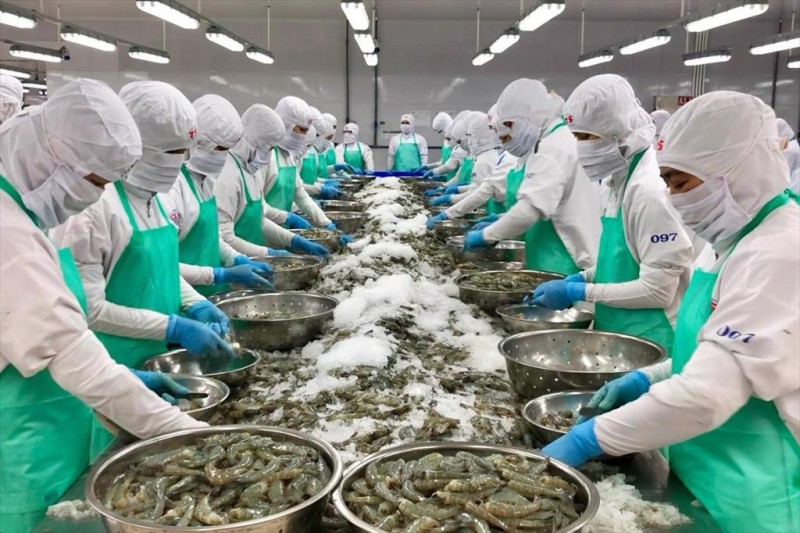 News
News
The market gradually recovered
In 2023, due to changes in the world and declining consumer demand, many large markets have reduced seafood imports from Vietnam. However, many countries in the EU are still considered stable markets when shrimp and pangasius exports have continuously recorded positive growth for many months. Typically in the German market, statistics from the Vietnam Association of Seafood Exporters and Producers (VASEP) show that in the first half of October 2023, pangasius exports to Germany reached a turnover of nearly 2 million. USD, nearly doubling over the same period in 2022. As of October 15, 2023, this European country consumed more than 30 million USD of Vietnamese pangasius, an increase of 35% over the same period in 2022.
Or like the Polish market, from the beginning of the year until now, while the Philippines' exports to the Polish market have continuously decreased, Vietnam's tuna exports are improving. Among tuna products exported to this market, canned tuna accounts for the largest proportion of more than 83% and over the same period, this product group increased sharply by 211%. Cumulatively in the first 10 months of 2023, tuna exports to this market still increased by 1%, reaching more than 143 million USD. Meanwhile, for the Italian market, in October 2023, tuna exports increased 30 times. And with this growth rate, Italy has risen to become Vietnam's largest tuna import market in the EU.
 |
| Take advantage of the EVFTA Agreement, promote seafood exports to the EU |
The Vietnam Association of Seafood Exporters and Producers (VASEP) assesses that the demand for Vietnamese seafood in the EU is gradually increasing again due to preparations for the year-end festival season. The EU is expected to be a bright spot for exports in the last months of this year when it is considered to have a more stable economy than other key markets.
According to fisheries experts, The Vietnam - EU Free Trade Agreement (EVFTA) takes effect in August/ 2020 has brought many incentives, creating more competitiveness for Vietnamese seafood products and is an opportunity for Vietnamese businesses to export directly to the European market.
In addition, the EU inspection team coming to Vietnam to work highly appreciated the Government's efforts in implementing measures to eliminate IUU yellow cards. At the same time, the EU has also studied Vietnam's seafood development program and made many recommendations to monitor fishing and aquaculture. This will help Vietnam quickly remove the seafood yellow card, thereby increasing exports to this market.
Build production chains to take advantage
Although, thanks to the commitments of the EVFTA Agreement, Vietnamese seafood will have many advantages to access the EU market in the near future. However, currently, requirements for seafood products exported to the EU are becoming more and more stringent. Of note is the growing number of regulations and requirements stemming from the European Commission's response to mislabelling and fraudulent environmental impacts.
Accordingly, the EU has currently regulated a number of additional contents such as: Food safety certification; Social compliance certification (European supermarkets often require their suppliers to be certified for social compliance by a third party, this certification mainly concerns processing facilities). The most widely accepted social compliance accreditation schemes are the SA8000 standard (SAI) and the business social compliance initiative (BSCI). There is also a Sustainability Certification.
Ms. Vu Thi Ngoc Diep - Commercial Counselor, Vietnam Trade Office in the Netherlands recommends that businesses need to strengthen the review of food safety and quality management programs according to the hygiene and safety quality management system. food (HACCP). In addition, businesses need to proactively establish production, processing, and export chains that meet market regulations, such as: Establishing initial production facility conditions and raw material standards; Inspect and supervise production facilities, preliminary processing of raw materials and semi-finished products to ensure food safety; Periodically or irregularly monitor and inspect the implementation of regulations on the use of antibiotic chemicals by raw material suppliers, and resolutely refuse to purchase, process, and export aquatic products containing harmful chemicals. originates from IUU fishing.
Regarding taking advantage of export opportunities into the EU market, Mr. Truong Dinh Hoe - General Secretary of the Food Processing Association and Vietnam Seafood Export recommends that in the coming time, businesses must strengthen strong products such as organic, sustainable, and value-added products; have appropriate sales and payment measures; At the same time, take full advantage of the advantages from the EVFTA Agreement to increase competitiveness for exporting to this market. At the same time, it is necessary to actively participate in specialized international fairs and exhibitions, especially in France, the Netherlands, Germany, and Spain to enhance product promotion and expand trade with import partners. export in the European market.
Ha Linh